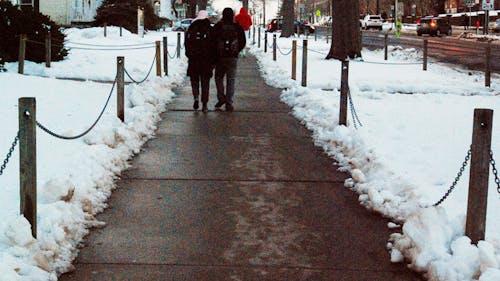Alumna conducts experimental feminism, ‘manslamming’

In a recent social experiment, Beth Breslaw decided to test physical displays of male privilege in a public space by “manslamming” on New York City sidewalks.
Breslaw, who graduated from Rutgers in 2012, decided to walk down busy city sidewalks without moving out the way and discovered men were generally not willing to step aside in the same way women were.
Breslaw said she consistently bumped into men who were unwilling to walk around her. She bumped into a significantly higher number of men than she did women, dubbing the practice “man-slam.”
“[I] basically only moved out of the way for children, elderly and differently-abled people,” she said. “[I braced] myself for collision constantly.”
A friend’s theory inspired the experiment, Breslaw said. By “manslamming,” she said she was putting the theory into practice.
“A friend mentioned that she had been conducting the experiment, but she really only travels [and] commutes in the financial district,” she said. “I decided to see what happens in the rest of the city.”
Breslaw’s experiment was featured on sites such as Huffington Post Live, The Guardian and The Daily Caller, who scrutinized the scientific credibility of “manslamming” considering the experiment’s busy urban setting.
She did not provide specific numbers on how many men and women she bumped into, although she told New York Magazine she could remember every man who moved out of the way, because so few did.
Anna Breslaw, Beth Breslaw’s sister, said conducting the experiment in an urban setting should underscore the magnitude of large-scale male entitlement in public spaces, not delegitimize it.
The hustle-and-bustle, city environment surrounding the experiment should be considered a control variable instead of a confounding one, said Anna Breslaw, a staff writer for Cosmopolitan magazine.
“Crowded city living was maybe the biggest control element, and Beth was an equal-opportunity slammer,”she said. “The fact is, in New York City, more men bumped into her and more women moved aside.”
This experiment might raise concerns about gender-based microaggressions in our society, said Laura Luciano, assistant director of the Office of Violence Prevention and Victim Assistance.
Typically brief or subtle, microaggressions are verbal, behavioral or environmental indignities that can manifest emotionally or physically, such as with“manslamming.” Luciano said microaggressions are difficult to call attention to or fix because most people do not identify them as harmful.
“The issue with microaggressions is that other people don’t recognize them as problematic,” she said. “The majority of people don’t acknowledge them or even understand that [they are] happening.”
Beth Breslaw said the alleged lack of male consideration “manslamming” is indicative of is detrimental to society because it makes marginalized people feel even more powerless.
Even though she said she could not speak to the experiment’s validity, Luciano agreed regardless of intention, Beth Breslaw felt she was being silenced as a result of a microaggression.
“I think that the message [Breslaw] got was that she [was] invisible,” she said. “Whether [or not] that was intentional by the people who were not moving or bumping into her, that was her takeaway.”
Breslaw’s experiment showcases the prevalence of male privilege in the most minute aspects of society, said Laurie Rudman, a professor in the Department of Psychology.
While many men are probably unable to recognize space entitlement as harmful, Rudman said others might be lashing out in response to threats to male entitlement.
“[Breslaw’s] experience suggests that some men might be oblivious to space entitlement, but others may forcefully defend male privilege by ‘teaching her a lesson,”she said.
Feelings of male entitlement are systematic, pervading several aspects of everyday life, including workplace rates of pay, Rudman said.
“Male privilege extends well beyond the right to take up more space to many other forms of entitlement,”she said. “[These include] feeling entitled ... to earn more money for doing the same work, to sexually harass women and to forcefully or manipulatively obtain sex.”
Anna Breslaw said having other people, especially white men, downplay her sister’s experiment is not surprising at all, but actually expected.
With this in mind, she said the argument against what many downplay to be “outrage culture” is not for men to judge, because they reinforce the patriarchal culture that made “manslamming” an issue of concern.
“It's not [a white man’s] job to create a hierarchy of ‘what to get offended about’ or ‘what is actually problematic’for women or people of color or anyone who has not had his exact experience,” Breslaw said.



